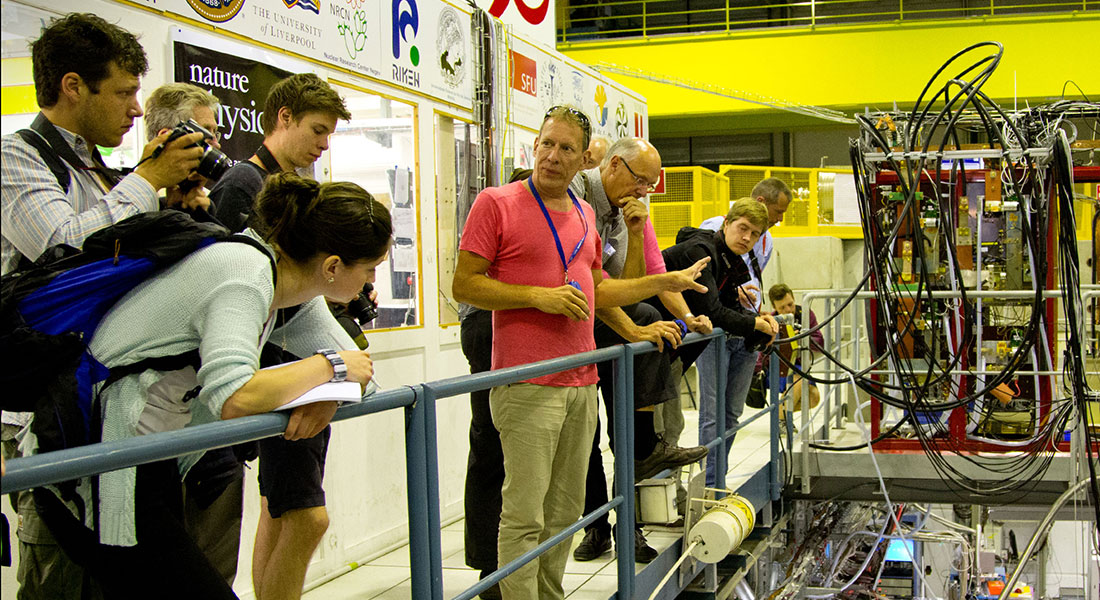NBIA Colloquium via Zoom by Jeffrey Hangst (Univ. Aarhus and CERN)

Illuminating Antimatter: the ALPHA antihydrogen experiment at CERN
Speaker: Jeffrey Hangst (Univ. Aarhus and CERN)
Title: Illuminating Antimatter: the ALPHA antihydrogen experiment at CERN
Abstract: The ALPHA experiment at the Antiproton Decelerator is unique in its combined ability to produce, trap, and study atoms of antihydrogen - the simplest anti-atom. The Standard Model requires that hydrogen and anti-hydrogen have the same spectrum. Transition frequencies in hydrogen can be measured with precision of order 10-15. The precision in antihydrogen at ALPHA is now of order 10-12, making atom/anti-atom comparisons among the most precise, direct tests of fundamental symmetries in Nature. Also of fundamental interest is the gravitational behaviour of antimatter, the study of which is the goal of the new ALPHA-g experiment. I will discuss the decades of development necessary to achieve the latest groundbreaking results in ALPHA. Among the latter is the demonstration of laser cooling of antihydrogen, published last week in Nature. I will then consider the future of spectroscopy and gravitational studies with anti-hydrogen in the era of CERN’s brand-new ELENA facility, which will deliver antiprotons to us in August of 2021.
Brief bio-sketch: Jeffrey S. Hangst is a graduate of MIT (BSc, MSc) and of the University of Chicago (PhD). He worked at Fermilab and at Argonne while doing his PhD at Chicago. He moved to Aarhus University in Denmark in 1994 and has been there since. Hangst received the European Physical Society's 1996 accelerator award for a young scientist for his work on laser cooling of stored ion beams in the ASTRID storage ring in Aarhus. He has been stationed at CERN full-time since 2001. He is a founding member of the ATHENA antihydrogen collaboration and was the Physics Coordinator of the experiment that produced the first cold antihydrogen atoms at the CERN Antiproton Decelerator (AD) in 2002. This breakthrough was featured on the cover of the New York Times. He is the founder and Spokesperson of the ALPHA collaboration, which demonstrated trapping of antihydrogen atoms in 2010, and the first laser spectroscopy of antihydrogen in 2016. ALPHA’s trapping of antihydrogen was voted ‘Physics Breakthrough of the Year’ by Physics World magazine in 2010. Hangst was elected to fellowship of the American Physical Society, Division of Plasma Physics, in 2005. He received the John Dawson award for excellence in plasma physics from the APS in 2011, and the Ångstrom medal from Uppsala University in 2013 for his work on trapped antihydrogen. He currently holds two prestigious Semper Ardens grants from the Carlsberg Foundation to pursue work on gravitational studies and spectroscopy with antimatter. He is also a member of the Royal Danish Academy of Sciences and Letters.
To participate on Friday, click on
https://ucph-ku.zoom.us/j/61333932427
The colloquium will be moderated by Mauricio Bustamante and we strongly encourage you to participate actively by asking questions during the talk. Mauricio will briefly remind you how this can be done just before the colloquium starts.
